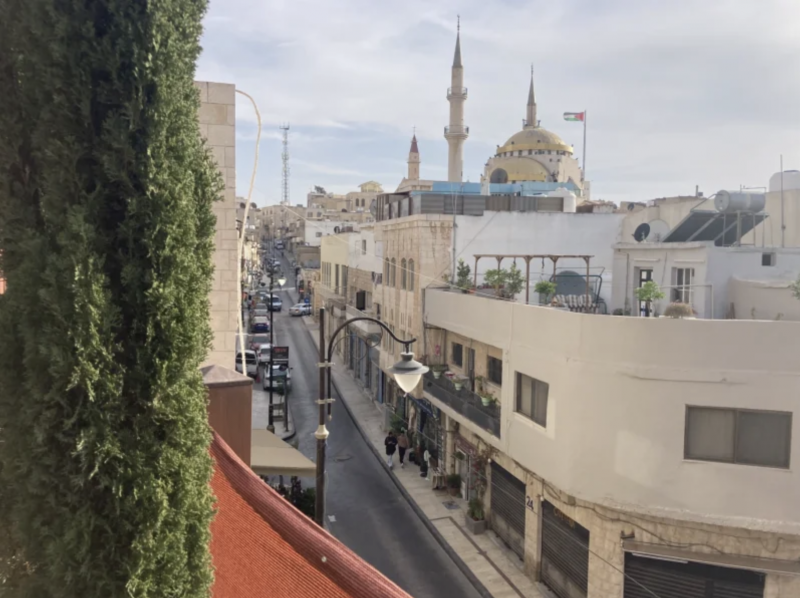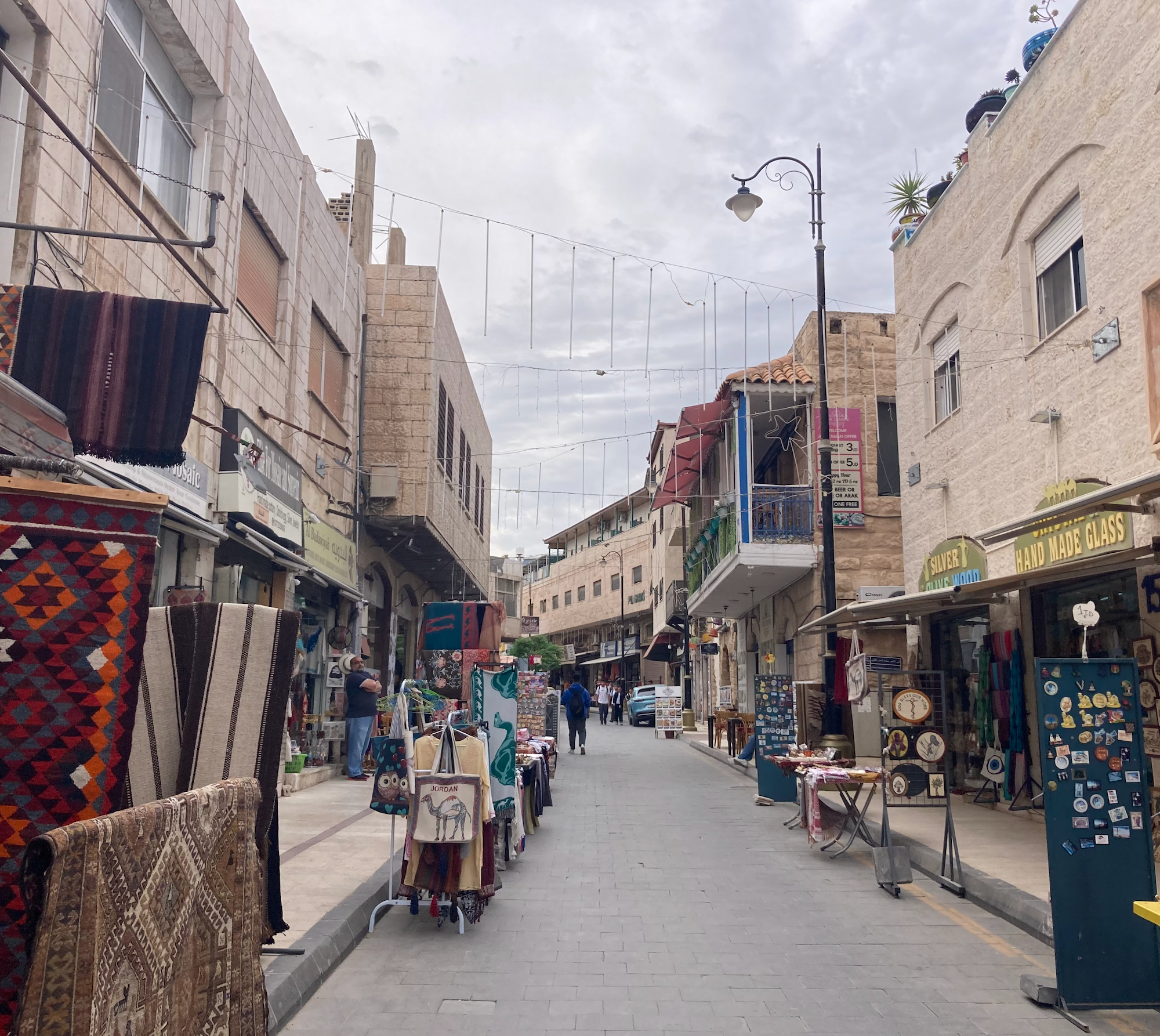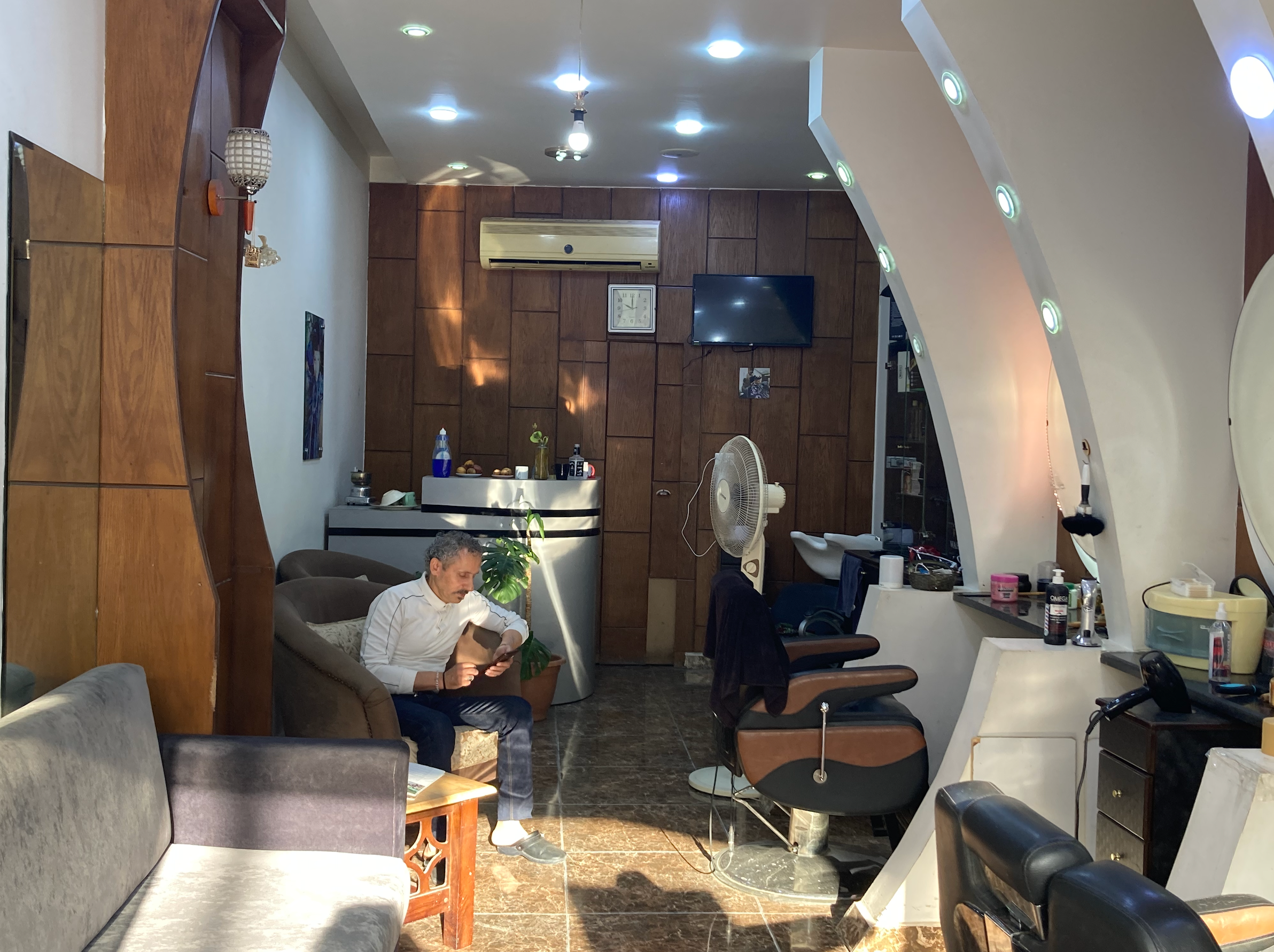
From the terrace of his restaurant, Essam, who extols peaceful coexistence between Christians and Muslims, points to a church and a mosque side by side in the distance. (Credit: Noura Doukhi)
In Madaba, few passers-by strolled the city center streets. Tourists were nowhere to be seen. In the early afternoon, calm prevailed, far from the capital’s racket.
Since Oct. 7, the town has remained impassive to the massive protests in Amman and other Jordanian cities in support of Gaza and Hamas. “There have been no protests, but we have stopped all celebrations,” said Essam, owner of a restaurant.
Nestled on a hill overlooking the Dead Sea, Madaba, with a population of almost 100,000, is located just 30 km south of Amman. Yet, everything differentiates it from the capital and the rest of the country. People all over Jordan have been shouting their love for the “resistance.” Here in Madaba, the Palestinian cause has been defended by all, but Hamas is not popular.
In a country where almost half the inhabitants are of Palestinian origin, Madaba is home to a majority of Jordanians of old lineage, with a third of the residents being Christians. The Christian minority is estimated at way less than 10 percent in Jordan. In the streets of the city center, the many churches, mainly Orthodox stand in sequence amid mosques and dozens of craft stores.
 A shopping street in downtown Madaba. (Credit: Noura Doukhi)
A shopping street in downtown Madaba. (Credit: Noura Doukhi)
‘It had its entire population killed’
Essam, looking sharp, was chatting on the sidewalk with the grocer next door. The 54-year-old is proud of having canceled all Christian festivities planned at his restaurant. “It wouldn't have been fair to do so, while people are getting killed in full view of everyone, while the world is not reacting.”
In the first few months of the war, Jordanians largely stopped going out in solidarity with Gaza. “Like everyone else in the country,” continued the businessman, saddened by the fate of the Gazans, victims of a much more powerful enemy.
“You can’t trust Israel. The same goes for the Jews. They killed Jesus!” argued the man of Christian faith. Unfairly blamed on the Jewish people, this has nurtured a Christian anti-Semitism that persists in the region.
Did this mean that Essam is on Hamas’ side? In front of the grocery store owner, who nodded in agreement, Essam didn’t spare the Islamist movement. “It had its entire population killed. For what, 100 prisoners?” he asked, ignoring the Palestinian group’s claims.
Although he praised the peaceful coexistence that unites Christians and Muslims, ethnic Transjordanians and Jordanians of Palestinian origin, the feeling that the latter’s presence weighs heavily on the country’s security was implied.
“Three-quarters of Palestinians here believe in the armed struggle and want war. That’s why Jordan must remain strong,” he said. “And the Palestinians must return to their country and have their state alongside an Israeli state,” he added.
Ahmad, a 55-year-old Palestinian and owner of a hairdressing salon, is his neighbor and long-time friend. “You have to know your enemy. When you face Israel, you know you’re going to plunge your entire population into death,” said the man from Ramallah, referring to Hamas.
 Ahmad, a Jordanian-Palestinian, in his hairdressing salon in downtown Madaba. (Credit: Noura Doukhi)
Ahmad, a Jordanian-Palestinian, in his hairdressing salon in downtown Madaba. (Credit: Noura Doukhi)
He has only known Madaba, where he was born and raised. Although he said he is deeply affected by the situation in Gaza, the kingdom is his home. He leads a comfortable life there and is delighted that his five children are “all educated.” Ahmad disapproved of Jordan’s possible involvement in a war.
‘All behind King Abdullah’
In her small sewing workshop on a street adjacent to the souk (Arabic for market), a 29-year-old woman was repairing torn clothes. Only a few customers have come to her store for nearly seven months.
“People stopped going out after the war,” said Lama, a design teacher at two universities to make ends meet. Foreigners are few and far between, especially after Iran fired drones at Israel almost a month ago, she said. That night, Lama didn’t sleep a wink for the first time in years.
“It was terrifying to hear the sound of the missiles and see the sky light up. We’re not used to this.” Various Jordanian reports noted that debris from missiles was found in the suburb of Marj al-Hamam, near the capital, just 20 kilometers from Madaba.
Lama did not worry about that, for whom this episode of fear remains an exception. “We live in safety and with no fear. We’re all behind King Abdullah.”
While the young woman reiterated that “Here, Jordanians and Palestinians are the same people,” which everyone else also said, and takes the Palestinian cause to heart, she has no opinion on Hamas. “I’m not interested in politics,” she said.
Malek, a Muslim from Karak (a few kilometers from the Dead Sea), made outlying remarks near the souk. “We pray for the people of Gaza. May God be with the resistance and give them victory,” said the 32-year-old. Malek, who studied engineering, runs a small orange juice stand as he could not find a job in his major.
Before Oct. 7, his job had kept him afloat. Since then, almost three-quarters of all tourist activities have ceased, he said. As the conversation continued, Malek became wary and withdrew. “You’re not one of them [Israelis], are you?” he said, ending the discussion.
This article was originally published in L'Orient-Le Jour. Translated by Joelle El Khoury. Edited by Yara Malka.
